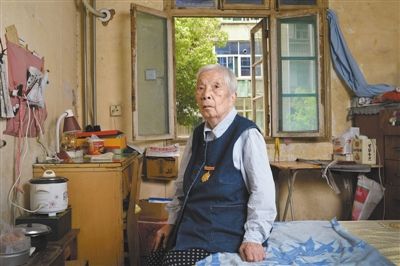95-year-old Liu Guiying
- By Li Shen
 0 Comment(s)
0 Comment(s) Print
Print E-mail China.org.cn, June 10, 2015
E-mail China.org.cn, June 10, 2015
|
95-year-old Liu Guiying, a veteran of the China Expeditionary Force, recalled her 3-month ordeal in jungles in Myanmar during the Second World War at her home in Anhui Province. [Photo: The Beijing News] |
95-year-old Liu Guiying, a veteran of the China Expeditionary Force (CEF), is one of a few soldiers who survived the killing in the northern Myanmar jungles during the battles against the Japanese in World War II.
Liu recalled her three-month ordeal in the jungle during a retreat in 1942 in an interview with the Beijing News. She served as a nurse in the New 22nd Division of the Fifth Army of the China Expeditionary Force. Her team was the first batch of the CEF that entered Myanmar to fight against the Japanese troops in order to protect an international supply passageway linking southwest China's Yunnan Province and Myanmar.
Japan attacked Pearl Harbor in Hawaii on Dec. 7, 1941. Sixteen days later, it bombed Yangon, then the capital of Myanmar and threatened British rule in Myanmar. On Dec 26, China and Britain signed an agreement to jointly protect the supply line. From March 1942 to March 1945, China sent 400,000 soldiers to fight against Japanese troops in the battlefields of Myanmar and India.
The first batch of the CEF had defeated the Japanese troops in several rounds of fierce combat and provided vital help to the British army three months after it arrived there. However, due to the lack of integration with the British army and strategic mistakes, the first troops were fighting unsupported and had to retreat to China and India.
Liu's brigade arrived in the Hukawng Valley, an area of north Myanmar covered by subtropical mountain jungle in May, 1942. "Hukawng Valley" in Myanmese means a land for devils. To Liu, it meant a road to death.
In a small village at the entrance to the mountain, Liu saw more than 1,000 charred bodies of CEF soldiers. They were wounded soldiers who could not retreat with the troops. To avoid captivity, they burned themselves on May 21, 1942.
When she entered the jungle, Liu only took four things with her -- a bag of food which was sufficient for a week, a glass jar for cooking, a piece of tarpaulin and a blanket.
Ten days later, her food had run out. The horses and cows were butchered and the troops then boiled gun cases and belts to eat. Fruits on the trees were often poisonous, so Liu dug up wild banana roots to satisfy her hunger. But eating a lot of the roots gave her diarrhea. Sometimes, after a whole day's search, Liu was empty-handed and had to drink boiled water.







Go to Forum >>0 Comment(s)